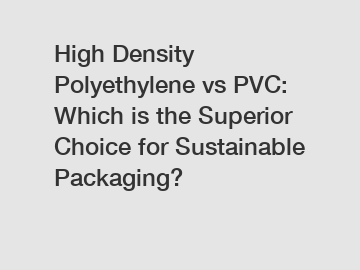High Density Polyethylene vs PVC: Which is the Superior Choice for Sustainable Packaging?
High Density Polyethylene vs PVC: Which is the Superior Choice for Sustainable Packaging?
When it comes to sustainable packaging materials, both High Density Polyethylene (HDPE) and Polyvinyl Chloride (PVC) are widely used in various industries. However, which one should be considered the superior choice? In this article, we will delve into the differences between HDPE and PVC, examine their environmental impact, and discuss why HDPE emerges as the clear winner for sustainable packaging solutions.
Comparing the Environmental Impact.

HDPE is a thermoplastic made from petroleum, while PVC is a synthetic plastic derived from salt and natural gas. From the production stage to disposal, both materials have different environmental impacts.
Production: HDPE requires less energy and emits fewer greenhouse gases during production compared to PVC. This is mainly because HDPE production process involves fewer chemical steps and lower energy consumption.
Recyclability: HDPE has a higher recycling rate than PVC. HDPE is classified as a #2 plastic and can be easily collected, melted, and remolded into new products. On the other hand, PVC is a #3 plastic and is less frequently recycled due to the difficulty in removing additives such as chlorine.
Durability: HDPE exhibits superior durability, making it ideal for packaging applications. It is resistant to cracking, tearing, and impact, reducing the need for frequent replacement. In contrast, PVC is prone to degradation over time, leading to the release of harmful chemicals into the environment.
Toxicity and Health Concerns: PVC contains additives that can be harmful to human health and the environment. For example, phthalates and lead are often found in PVC formulations, which can have adverse effects on human reproductive systems and cause environmental pollution. HDPE, in comparison, is free from such additives and is considered to be non-toxic.
Regulatory Standards: HDPE is widely recognized as a safe and sustainable material by regulatory bodies such as the U.S. Food and Drug Administration (FDA) and the European Food Safety Authority (EFSA). PVC, on the other hand, faces stricter regulations due to health and environmental concerns.
The Significance and Impact.
Considering the various factors discussed above, it is evident that HDPE surpasses PVC as the superior choice for sustainable packaging. By opting for HDPE, companies can reduce their carbon footprint, minimize environmental pollution, and ensure the safety of their products.
The use of HDPE in sustainable packaging solutions also aligns with the growing global focus on a circular economy. Its high recyclability allows for the creation of a closed-loop system, reducing the dependence on virgin materials and promoting resource conservation.
Moreover, choosing HDPE over PVC can enhance brand reputation and consumer trust. In today's environmentally conscious society, consumers are actively seeking products packaged in sustainable materials. By making the switch, companies can demonstrate their commitment to sustainability and attract eco-conscious customers.
In conclusion, HDPE stands out as the superior choice for sustainable packaging due to its lower environmental impact, higher recycling rate, durability, non-toxicity, and compliance with regulatory standards. By embracing HDPE, companies can contribute to a greener future and meet the demands of eco-conscious consumers. Let's make a sustainable choice for the packaging industry.
The company is the world’s best buy resistant rubber dredger hoses, hdpe dredge pipe manufacturer, nepal hdpe pipe supplier. We are your one-stop shop for all needs. Our staff are highly-specialized and will help you find the product you need.


